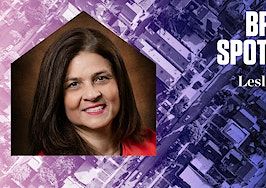 What decisions and paths should the real estate industry be prioritizing? And how can you, whether managing a team or an entire company, bring those best lessons to bear where you work? In February, in advance of building an industry blueprint at Inman Disconnect, we’ll plumb the topic of leadership with Q&As with top industry leaders, contributions from esteemed Inman columnists and more.
What decisions and paths should the real estate industry be prioritizing? And how can you, whether managing a team or an entire company, bring those best lessons to bear where you work? In February, in advance of building an industry blueprint at Inman Disconnect, we’ll plumb the topic of leadership with Q&As with top industry leaders, contributions from esteemed Inman columnists and more.
Agents join teams because they believe it will make them more productive and successful in reaching their goals. What’s the secret sauce of the teams who grow and succeed in reaching their goals? It all comes down to the team leader and if they understand that their most important role is to lead the team and facilitate change.
They also need to understand that their most important tool is accountability. When accountability is lacking, performance, culture, and morale all suffer. Agents will leave a team when they aren’t achieving their goals — or those things that convinced them to join a team in the first place. Here are five steps for implementing accountability for team success.
Set clear goals
Team members need to know where they are going, why they want to be there, and what they need to do to get there.
Meet one-on-one to set specific, measurable, and action-based goals for their business and life. The individual goals should align with the why behind their business and fit into the goals the team leader has set for the team as a whole. It’s important here to also clarify the expectations that the team member has of the team leader.
Get commitments and motivate
Have team members share their business goals with the group, including how much, by when and where they will be logged. It’s important to keep goals front and center, so they can serve as motivation and stay top-of-mind.
This could be a tracking sheet of daily habits of success, a dashboard on a TV or computer screen, or simply reviewing it in a daily team huddle. Team members can motivate each other when everyone knows their commitment — whether they need appointments, calls, closings, or showing up to meetings and script training.
Check-in regularly
Ask questions to solve problems and facilitate change. This is especially important if the team leader is providing leads or using team resources to support team members in building their business.
Here are some great examples:
- Did you have a commitment? Did you keep it?
- What got in the way?
- What did you learn?
- What are you going to do differently?
- Acknowledge them for what they did accomplish!
Set an example!
As Verl Workman says, “Accountability is love.” Team leaders need love and support just like they provide to their team members. Holding yourself accountable to your goals is love. Loving yourself doesn’t mean taking it easy and letting yourself sink into your comfort zones. It means having the self-discipline to reach your goals and getting support to be the best team leader you can be.
Comfort feels good, but nothing grows there. When you and your team have effective support and accountability, you’ll grow further.
Celebrate!
Support your team by celebrating small victories! Instead of just looking at the final goal, measure where the team member started and the progress they have gained, instead of just looking at progress to the final goal.
Praise in public — people want to feel appreciated for what they do and that their contribution is seen and important to the team.
Team members who are achieving their goals don’t leave. If an agent leaves because they don’t like accountability and are not achieving their goals after this process, then love them as they go out the door.
Wish them the best, but know it wasn’t a good fit, and open that spot to someone new. The other team members will respect your leadership more when you let someone who isn’t meeting expectations go. It’s your responsibility to invest your resources wisely and run a profitable team for all.
Leslie Guiley is a Designated Broker/Owner of Real Estate Advisors, LLC in Arizona and a Certified Coach with Workman Success. You can find and follow Leslie here.













